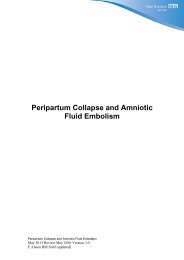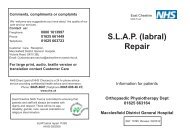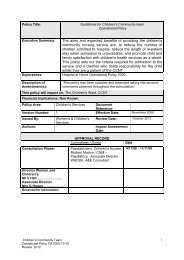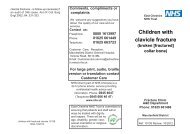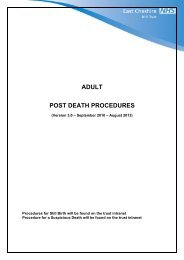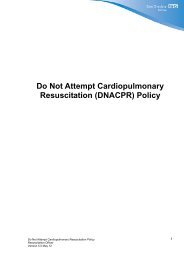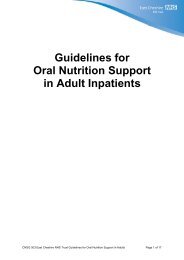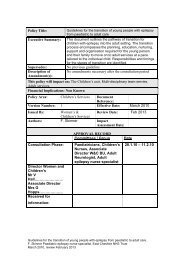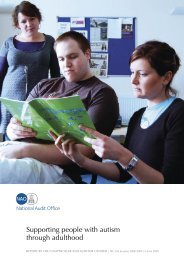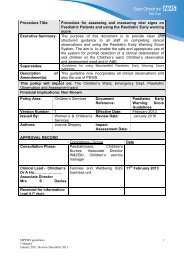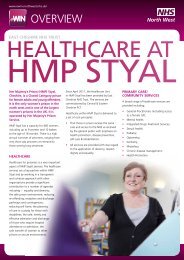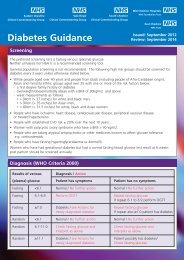Paediatric diabetes operational 1745.pdf - East Cheshire NHS Trust
Paediatric diabetes operational 1745.pdf - East Cheshire NHS Trust
Paediatric diabetes operational 1745.pdf - East Cheshire NHS Trust
Create successful ePaper yourself
Turn your PDF publications into a flip-book with our unique Google optimized e-Paper software.
Adherence to GuidelinesThe MDT looks to work within the framework of Local, National and International <strong>diabetes</strong>guidelines, including NICE, Every Young Person with Diabetes Matters, Diabetes NSF andISPAD consensus Guidelines.(http://www.ispad.org/FileCenter.html?CategoryID=5)(http://www.nice.org.uk/nicemedia/live/10944/29390/29390.pdf)These have been used to inform our local guidelines for the management of DKA, newpatients, hypoglycaemia and the care of young people undergoing surgery amongst others.Our local guidelines are used by the team for management of all aspects of <strong>diabetes</strong> care.The guidelines are currently available on the <strong>Trust</strong> intranet, stre@mline database andshared drive.The guidelines are widely available on trust computers in all areas of the hospital wherechildren and young people with <strong>diabetes</strong> may be seen. The guidelines are presented in aformat that allows printed copies to be made and kept in patient records during anyhospital admissions. The <strong>diabetes</strong> guidelines also provide advice to non‐members of theteam who may be contacted out of hours by children or their families. They include adviceon the management of illness and our sick day rules. This is to help on call teams giveappropriate advice at time when the MDT is unavailable such a weekends and at night.At junior doctor induction sessions access to these local guidelines are discussed so that allmedical staff is aware of their existence and how they can be accessed when required.Psychosocial AssessmentThe Service has recently adopted the Yorkshire and Humber <strong>Paediatric</strong> Diabetes NetworkWellbeing in Diabetes Questionnaire Tool to help the assessment of psychological need inchildren and young people with <strong>diabetes</strong>. Children identified as requiring psychologicalsupport are referred to the local CAMHS team. It is recognized that this is not an adequateservice. We hope with the introduction of the new tariff, psychology services will beimproved.EducationAt the time of diagnosis all new patients and their families will be seen by the coremembers of the MDT within 24 hours of admission unless this occurs at a weekend. It willbe the consultant’s responsibility to discuss the diagnosis with the young person and theirfamily, and to decide on an initial treatment plan. A structured education programme willbe started by the PDSN’s including the administration of insulin injections blood glucosetesting and blood glucose monitoring and the recognition and treatment of hypoglycaemia.The families will also be seen by our specialist dietician and the family will be given adviceabout basic dietary issues. The basis of carbohydrate counting will be discussed. Once theteam and the family are happy that these initial self‐management skills have been learntwe will aim to discharge the young person home.The PDSN’s and dietician will arrange follow up home visits over the next few weeks tosupport the family and to complete the structured education programme. Documentationof progress will be kept in the nursing record. These home visits will continue for as long asis judged necessary by the PDSN’s and the family.Written education material will be given to all families at the time of diagnosis and will bereferred to at future home and hospital visits. Families will also be given contact details forthe team at the time of discharge.Children’s Diabetes MDT Operational Policy May 23, 2012 16



